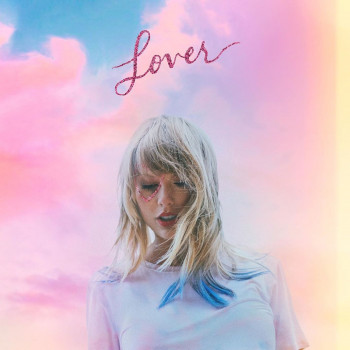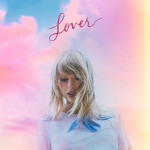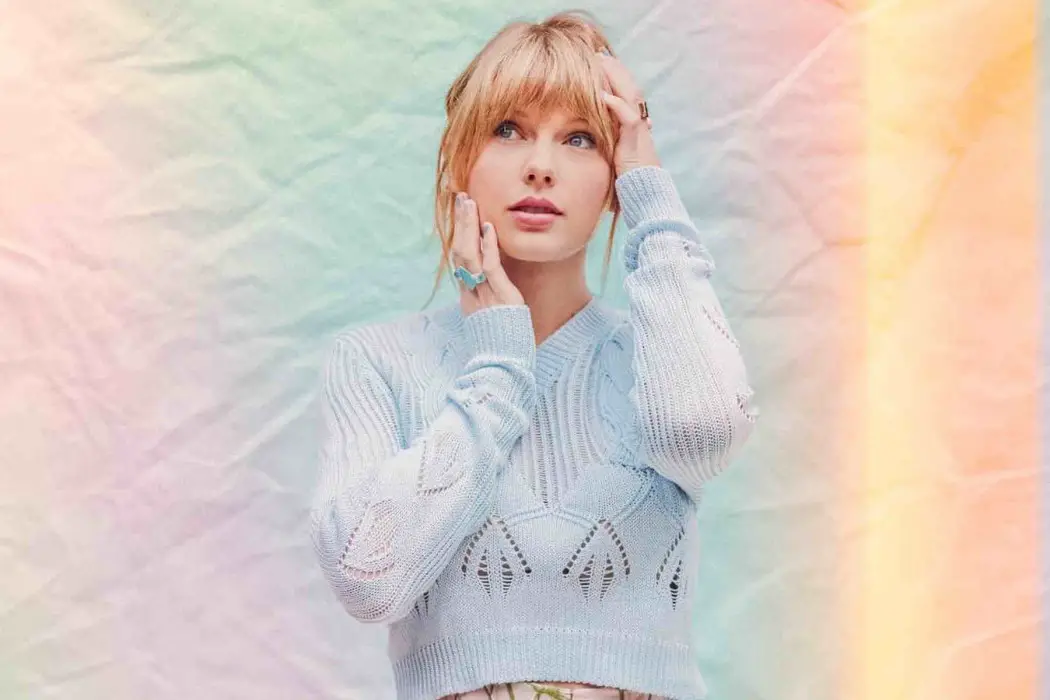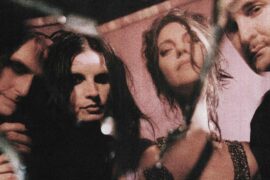Taylor Swift changes her tone, her color palette, and her pop range on new record Lover, but will she finally be able to change the divisive nature of her celebrity?
Listen: ‘Lover’ – Taylor Swift
Lover is a masterpiece, or it’s typical boring Swift; it’s brilliant, it’s too pop, it’s too political, it’s not political enough, it’s raw, it’s calculated, it’s a wide range of contrasting adjectives as audiences begin to form their opinions about the record. Most people, though, are coming in with a strong opinion on Swift as a public figure; it’s difficult not to have that influence how one perceives a song or an album, but it’s also difficult to admit how much that influences how we perceive an artist’s work. We love Lil Nas X in part because we want to love Lil Nas X; we champion his achievements and send him our praises not just because we enjoy “Old Town Road” but because we like him, his tweets, and his youthful glow. We like Billie Eilish because her voice is wonderful and her songs are great, but also because she’s weird in ways that are tremendously honest and endearing. Right now in the pop world audiences are excited about authenticity, and authenticity has become synonymous with odd, or atypical, or unusual. Basic is the word of the year, a label we put on artists who stay in a narrow, safe, and predictable pop lane; what happens, though, when an artist’s most authentic voice is bubblegum pop, when its catchy choruses, love songs, and pop sensibilities that they adore?

Swift makes pop that is unapologetically delicious with very few strikes of weird; the notes are perfect, the productions, even when they’re interesting, are never too unusual, and you can’t imagine a producer ever saying anything like “let’s make this part bizarre.” This is true for Swift’s public image as well, as she’s always gorgeous, always vanilla, and always on brand; to many, this appears to be the calculated persona she’s built to sell herself. When Swift is perceived as the bad girl who pretends to be good, the wolf in sheep’s clothing, that ultimately makes her the villain and those who see through that facade the good guys; it gives people on Twitter a rush as they find joy in hating her, and they have permission to hate her because hating the bully is fine, right? But where did this idea come from and how is Swift seen as the bully? Why do so many people hate Taylor Swift?
Hate for Swift comes from a few arenas that perhaps can be simplified down to three; people hate her lack of political voice, her brand of pop, and who they presume her to be. In regards to her politics, Swift is stepping into this era with a strong progressive voice; she’s endorsed democratic candidates, she’s criticized the president, and she used her video for “You Need to Calm Down” as a stage to promote LGBTQ rights. On that stage she was met with a lot of criticism, and when the situation is stripped down to headlines it’s quite understandable why people felt the way they felt.
At a glance, the video is Pride commodification at its finest; a straight cisgender artist has written a song about LGBTQ rights to release during Pride Month in the same fashion that many businesses become a rainbow brand in June to sell more services to LGBTQ customers and allies. Swift, it appeared, did just that; she didn’t mention gay rights until it was profitable to her, and when it became a commodity she could sell she did so fervently, even going as far as to visit queer holy grounds such as Stonewall to promote her record and sell her allyship.
The truth doesn’t exist in an entirely different reality than this perception of “You Need to Calm Down;” it’s quite true that the song wasn’t released in June by accident and was fully intended to strike down in the heat of Pride to make the biggest impact possible. What this hot take retelling of the situation lacks, though, is that Swift dedicated all of her voice and attention in June towards the Equality Act, a bill that was passed by the House in May but has yet to be addressed by the Senate. Swift created a petition that hundreds of thousands of people signed and shared, including many presidential front runners, which served the purpose of informing the public about the Equality Act and pressuring the senate to respond positively towards it. Her twitter bio wasn’t “Buy ‘You Need to Calm Down’ on iTunes”; it was instead, “Support the Equality Act, sign the petition below,” with a link redirecting folks over to it. Every tweet and retweet was in regards to the Equality Act, every reblog on Tumblr mentioned it, and at the end of the video for “You Need to Calm Down,” a title card urges people to go and sign it.
In truth, the song isn’t really about Pride, or solely about LGBTQ rights, but rather it’s about silencing negative voices that are trying to drown people out; in verse one it’s about her being dragged down, in verse two it’s about LGTBQ folks, and in verse three it’s about women. The media’s sell of this being a gay anthem was bound to bring critique, and rightfully so, but the hate Swift has encountered in regards to this is mostly in response to things that aren’t true. Swift did more positive political activism in June than all of the other artists on the Top Forty roster combined. She performed at Stonewall for a charity event that she was invited to, and she didn’t even play “You Need to Calm Down.” Diving into the complexity of situations and fact-checking them is a lot less fun than reading 280 character hot takes on Twitter, so the public will undoubtedly continue to sip their tea and watch her reputation burn. The Equality Act petition wasn’t Swift’s first or last act of politicism in this new era, and as she ventures sonically into the land of equality with songs like “The Man,” it appears she’s not about to let public perception of her motives stop her from speaking up. This new era is bound to be filled with Swift’s political thoughts, essays, posts, and songs, as well as moments where she isn’t the perfect progressive voice (most recently her deal with Amazon); if you hated the way she engaged politically in the first half of this year, you’ll probably hate the way she does it from here on out, but perhaps you hate the story of her money-motivated political efforts as told by headlines rather than her actual activist efforts. Swift’s political activism has only just begun its evolution; it’s bound to be messy, ill perceived, wrong at times, and misconstrued, but at the end of the day she’s receiving more critique for dedicating her time to supporting LGBTQ rights than her comrades on the charts are for staying silent.
While she’s recently been criticized more for her political actions, historically she’s been thoroughly critiqued for writing romantic songs; placing love at the center of her art has led her to being called childish, bland, unextraordinary, and a slew of other negative adjectives. In the album’s foreword Swift writes, “This album is a love letter to love itself – all the captivating, spellbinding, maddening, devastating red, blue, gray, golden aspects of it.” Lover, as a personified record, doesn’t give a shit; it’s ready to be a colorful, pastel, glorious romantic tale, regardless of what you think about it. There’s a strong use of high school imagery throughout the record, especially in the song “Miss Americana & the Heartbreak Prince,” a song that some analyze is about finding comfort in a time of political disruption in our country.
In the foreword Swift discusses how her old diary entries from high school acted as inspiration for this record, in large part because they were written in a past before the song that killed the old Taylor (“Look What You Made Me Do”) and before Swift found her darker edge on reputation. In the foreword she goes on to say, “I wrote about tiny details in my life in these diaries from a bygone age with such…wonderment. Intrigue. Romance. I noticed things and decided they were romantic, and so they were.” Swift’s most authentic self is a romantic spirit, a woman who loves love, and on this record she doesn’t care if you think that’s silly or juvenile; the Swift on reputation strived to get away from that romanticization of relationships, but the Swift on Lover is using high school imagery and diary entries to travel back to a time when she felt like she was allowed to romanticize love, a time when she was praised for her ability to write about relationships rather than critiqued for it. Some critics are calling her use of high school parallels a sign that while Swift is getting older, she hasn’t really grown up. In a moment when the president is being compared to a school yard bully as he makes up ugly nicknames for all his opponents, Swift is following along and comparing her opponents (or maybe even our opponents) to people on a playground and in school hallways; in doing this, Swift is both traversing her past and using current political themes to explore our collective present state. What many might call vanilla, the idea of writing an album focusing on big love songs and high school narratives, Swift calls her truth; her productions are centered around her lyrics rather than instrumental drops, her stories are confidently romantic, and her record resists the urge to conform to nonconformity. In a time when darker tones and odd productions are finding home on Top Forty airwaves, Swift is going to be as poppy and as colorful as she wants.

Though many people know Swift through her albums and her lyrics, many more people know her through her singles and her reputation. The character a lot of folks know as Taylor Swift is a media created plot point; she’s the Swift who goes through guys carelessly, the one who lied about Kanye, and the one who’s conniving to get fans to love her so they’ll buy into the idea of her. Then there’s the Swift of fan adoration; this is the woman who sends money to fans, the one who buys them pizza when they’re waiting outside at her shows, and the one who knows their names and talks to them on Tumblr when they’re going through a hard time. Who is the real Taylor Swift and who is the manufactured caricature? Has the media been selling Swift’s fake persona, or is she selling a different fake persona herself?
Some of the strongest evidence we can use to discover who the real Taylor Swift is comes from her lyrics. Most likely, Swift chose to name her album after track three, “Lover,” because that’s the song closest to her on this record and that’s the one she feels represents her most authentic self; diving into “Lover” we get to see a less candy pop side of Swift, as the track is self-written and vulnerable in ways that are heartfelt and honest, simplistically produced with acoustic guitars and a drum kit that sounds like it was sitting in your dad’s garage for years before Jack Antonoff tuned it up and put it in his studio. The track is about her lover whom she’s built a solid foundation with; they live together, they make decisions together, and they exist in that glorious moment when someone feels so comfortably familiar while still carrying some dazzling mystery in their charm and sincerity. The chorus is simple in ways that echo the song’s production, but in 12 words Swift conveys a world of adoration:
Can I go where you go?
Can we always be this close?
Swift has built a fandom of lyric lovers; songwriting is the fabric of who she is as an artist, and her listeners go wild for a good verse or bridge. “Lover” carries a bridge that doesn’t disappoint, with twelve bars of confessional romance and poeticism it’s a strong symbol for what this record and era will bring. Before the track was even released fans were wild over a part of the bridge that was teased, a couple of lines playing at the hem of a promise of long term love.
My heart’s been borrowed
and your’s has been blue,
all’s well that ends well
to end up with you
Ultimately if you don’t like Swift’s work you probably won’t like this song because it is deeply Swift; it’s not the Swift of reputation, and it’s not the bubblegum pop Swift of current Top Forty radio, but it’s also both of those Swifts. It’s as honest as reputation, as pastel as Lover’s leading singles, as country as she was when she was a teenager and as much of a storyteller as she’s always been. This song could serve as the thesis statement for this new era of Swift, as it shows listeners that on this record she’s somehow finding a new beginning while also going back to her roots; the dark guarded tone of reputation is gone, the enthusiastic glow of 1989 is refreshed, and the honesty of Red is back, this time with even more vulnerability. While the album definitely has some incredible productions and flare, Swift’s lyricism is the pillar that everything else stands upon and that’s what this song represents, for “Lover” is Swift when she’s uncovered, no pop beats behind her, no co-writers beside her, as she sings with that honesty that she’s both hailed for and critiqued for.
Perhaps “Lover,” the song and album, isn’t your cup of tea because it’s too love-centered, or perhaps you just can’t get past who Swift is as a public figure; regardless, it’s tough not to recognize that when the lights are gone, when the stage is torn down, when it’s just her in a living room in New York in her off season, this is who Swift is, a woman with an acoustic guitar and a poetic touch.
— — — —

Connect to Taylor Swift on
Facebook, Twitter, Instagram
Discover new music on Atwood Magazine
? © Taylor Swift
Lover
an album by Taylor Swift








